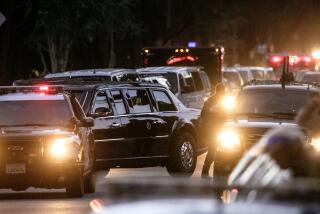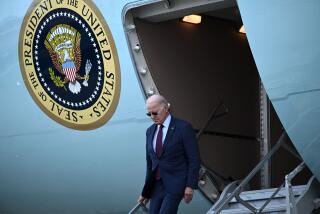MANDELAâS VISIT TO L.A. : Tutu Visits Prepared Way for Mandela
Although black South African leaders Desmond Tutu and Nelson Mandela are united in their insistence that economic sanctions against the government of their country must continue, there have been differences in their styles, missions and receptions during visits to the United States.
Tutu, the jovial, peace-talking Anglican archbishop who preceded political leader Mandelaâs visit by almost two months, has been cast in a kind of âJohn the Baptistâ role, an advance man for Mandelaâs reception as a world-class superhero.
Tutu âhelped prepare the way for Mandela,â said Edmond Browning, the presiding bishop of the Episcopal Church. âHe has held up the moral and ethical issues of apartheid. Now, Mandela can come in with the necessary political skills and influenceâ with the U.S. government, Browning said.
Tutu, 58, who heads the Anglican Church in the Province of Southern Africa, has often come to the United States, including his recent 10-day visit to Southern California. His trips here are primarily to speak in churches and at universities and to raise scholarship money so disadvantaged black African youths can study at U.S. universities.
Mandela, 71, a Methodist layman and deputy president of the African National Congress, is making his first U.S. visit and Tuesday became the first black private citizen to ever address a joint session of the U.S. Congress.
Those who know both men say the difference in their messages is in nuance rather than substance.
âBoth have a vision for justice and a truly nonracial charter of freedom for their country,â said Brian Sellers-Petersen, director of the Center for South African Ministry, an arm of All Saints Episcopal Church in Pasadena.
âMandela talks in political terms against the supremacy of either black or white . . . Tutu talks in the same way but in more theological terms . . . about the humanity of God and his reflected glory in us,â Sellers-Petersen added.
Mark Ridley-Thomas of the Los Angeles office of the Southern Christian Leadership Conference noted that both Tutu and Mandela are students of liberation theology--Tutu from the theoretical perspective and âMandela from a jail cell, which gives you a very different cut on it.â
Tutu, a diminutive figure with a hint of impishness often glowing from his eyes, is given to flowery descriptions, effusive expressions and ready wit.
When a stained glass window bearing his likeness was unveiled at an Altadena church last month, he appreciatively joked that he was âtongue-tiedâ--an affliction, he said, âmany in the South African government wish would be permanent.â
Mandela, also charismatic, generates excitement in a quiet way. He speaks bluntly, softly and often in a lilting South African accent. A lawyer by training, he usually reads his speeches, stands very erect and greets people with a calm, dignified manner.
The two African leaders, who have been close friends over the years, are not far apart on their views about armed struggle, according to associates.
The politically savvy Mandela locked horns with the White House Monday when he politely but firmly told President Bush that he would not renounce the use of violence if other efforts failed to end white domination of his country.
Though in his speeches Tutu has concentrated on the renunciation of violence, âhe understands it,â said the Rev. George Regas, rector of All Saints in Pasadena and a longtime Tutu friend.
More to Read
Sign up for Essential California
The most important California stories and recommendations in your inbox every morning.
You may occasionally receive promotional content from the Los Angeles Times.










